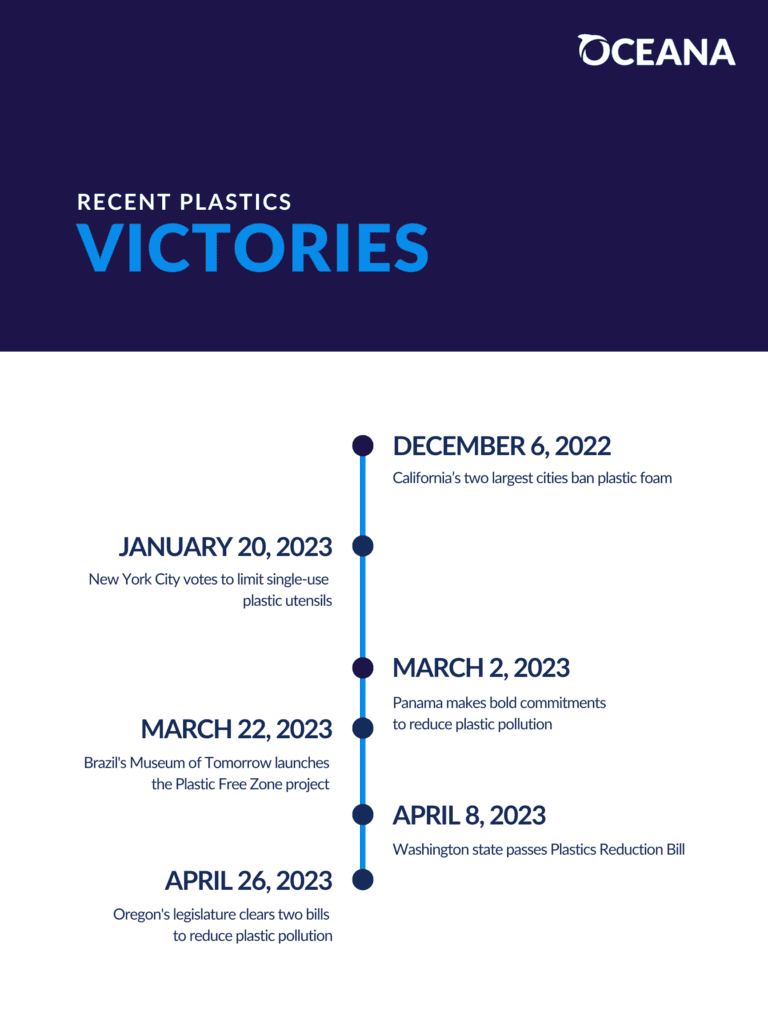May 30, 2023
VICTORY: Panama, Brazil, and US states take action against plastic pollution
BY: Caroline Mowdy
Plastic pollution is one of the greatest threats facing our planet today. Scientists estimate that two garbage trucks’ worth of plastic enter the ocean every minute. Plastics also pollute the air we breathe, the water we drink, the food we eat, and even our own bodies. On top of all this, rapidly-growing plastic production and pollution are leading contributors to climate change.
But there’s still hope – if we stop plastic pollution at the source. In just the last six months, momentum has been growing across North, Central, and South America to combat the plastics pollution crisis. From the U.S. Pacific Northwest to Brazil, Oceana is winning campaigns to reduce and eliminate unnecessary single-use plastics, while promoting refillable and reusable alternatives.

Three of the largest U.S. cities take on single-use plastic
Between December 2022 and January 2023, Los Angeles, San Diego, and New York City all enacted bans or restrictions on single-use plastics, following campaigning by Oceana and its allies. Los Angeles and San Diego banned expanded polystyrene, the plastic foam often used to produce single-use cups, plates, and other foodware. All three cities introduced restrictions on the single-use plastics restaurants are permitted to provide to customers. Los Angeles also extended its single-use plastic bag ban and now requires zero-waste plans for all city buildings and events.
Panama makes bold commitments to reduce plastic pollution
In March 2023, Panama’s Ministry of Environment announced commitments that will put a stop to the more than 160,000 tons of plastic that is imported and consumed in the country each year. The commitments include eliminating the use of single-use plastic items in three years, reducing the import and consumption of plastic packaging by 30% in five years, reducing the import of virgin plastic — that is, newly-made plastic — by 20% in seven years, and reducing the import and sale of single-use plastic and virgin plastic by half in 10 years. Panama was the first Central American nation to ban plastic bags and continues to be a leader in the fight to address plastic pollution.
Brazil’s Museum of Tomorrow combats single-use plastics in Rio
Also in March 2023, the Museum of Tomorrow, located in Rio de Janeiro, Brazil, became the first “plastic-free zone” in the country. The initiative, which was completed in partnership with Oceana, bans single-use plastics from entering and being distributed or sold within the museum. Oceana is helping the museum replace high-demand plastic items, such as bubble wrap, with plastic-free solutions like honeycomb paper or brown paper.
U.S. Pacific Northwest passes legislation to tackle plastic pollution
In April 2023, the Washington State Senate passed House Bill 1085, a bill that requires water bottle filling stations to be installed in new buildings that have water fountains and the phase-out of single-use plastics used for toiletries in hotels and other lodging establishments. The law, which passed via a bipartisan vote, also bans soft film-wrapped polystyrene foam floats and docks, platforms that float on bodies of water and take hundreds of years to degrade.
The following month, the neighboring U.S. state of Oregon passed two bills, Senate Bill 543 and Senate Bill 545, with bipartisan support to reduce plastic pollution. The first bill prohibits polystyrene foam foodware, coolers, and packing peanuts, and bans PFAS, highly toxic substances nicknamed “forever chemicals,” from food packaging starting Jan. 1, 2025. The second bill directs the Oregon Health Authority to update the state’s health code to allow restaurants to use reusable containers when serving their customers.
Oceana has achieved 25 victories to reduce and eliminate single-use plastic, and its recent victories across North, Central, and South America show that tides are continuing to change. It is possible to combat plastic pollution – one of the ocean’s greatest threats. Putting in place local, state, and national policies to reduce plastics at the source will help protect the oceans, communities, and climate.



